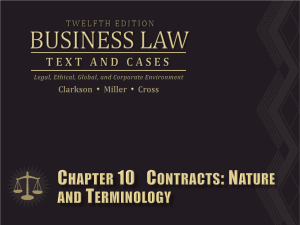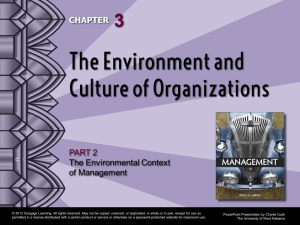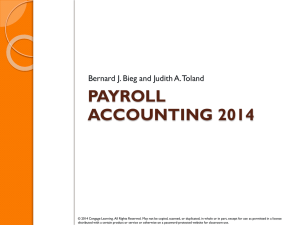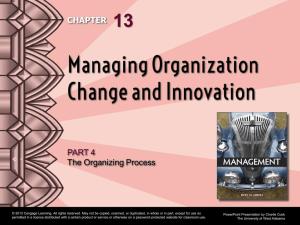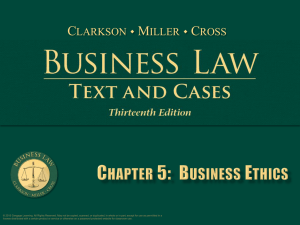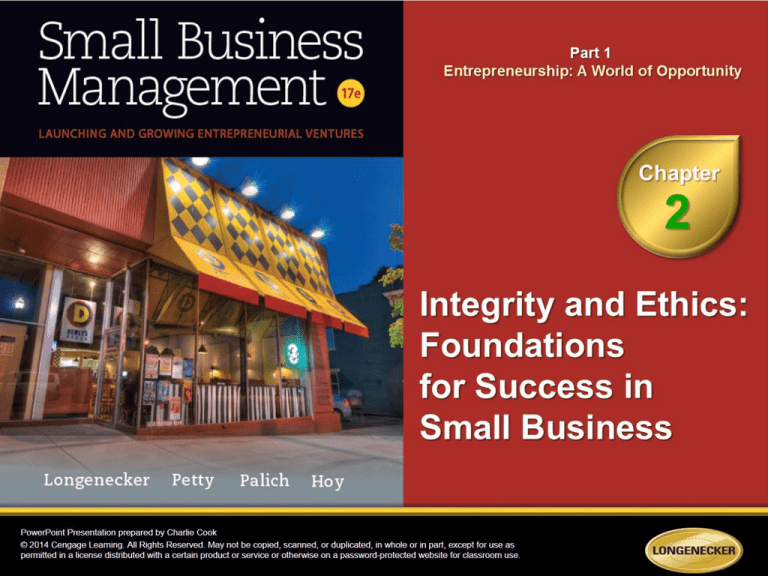
1. Define integrity, and understand its importance
to small businesses.
2. Explain how integrity applies to various stakeholder
groups.
3. Identify some common challenges and benefits of
maintaining integrity in small businesses.
4. Suggest practical approaches for building a business
with integrity.
5. Define sustainable small business, and describe the
influence the trend is having on small companies and
startup opportunities.
© 2014 Cengage Learning. All Rights Reserved. May not be copied, scanned, or duplicated, in whole or in part, except for use as permted
in a license distributed with a certain product or service or otherwise on a password-protected website for classroom use.
2–2
Integrity and Entrepreneurship
• What Is Integrity?
A general sense of honesty and reliability that is
expressed in a strong commitment to doing the right
thing, regardless of the circumstances.
Honesty, reliability, and fairness in business practices
An essential element of successful business relationships
Is as much about what to do as it is who to be.
• Doing the Right Thing
Ethical issues—questions of right and wrong
Legal and ethical considerations
Conflicts of self-interest
© 2014 Cengage Learning. All Rights Reserved. May not be copied, scanned, or duplicated, in whole or in part, except for use as
permitted in a license distributed with a certain product or service or otherwise on a password-protected website for classroom use.
2–3
2.1
Frequently Observed Forms of Workplace Misconduct
© 2014 Cengage Learning. All Rights Reserved. May not be copied, scanned, or duplicated, in whole or in part, except for use as
permitted in a license distributed with a certain product or service or otherwise on a password-protected website for classroom use.
2–4
2.2
Four Types of Responsibilities for Small Businesses
© 2014 Cengage Learning. All Rights Reserved. May not be copied, scanned, or duplicated, in whole or in part, except for use as
permitted in a license distributed with a certain product or service or otherwise on a password-protected website for classroom use.
2–5
“Big Three” Primary Stakeholders—
Owners, Customers, and Employees
© 2014 Cengage Learning. All Rights Reserved. May not be copied, scanned, or duplicated, in whole or in part, except for use as
permitted in a license distributed with a certain product or service or otherwise on a password-protected website for classroom use.
2–6
Kinds of Ethical Issues
• Ethical Issues in Business Operations
Income and expense reporting (tax fraud)
“Truth in advertising”—persuasion and deception
Bribing customers and rigging bids
Direct selling—pyramid schemes, bait-and-switch
selling
Effects of owners’ ethics on their employees
Accurately reporting financial information
© 2014 Cengage Learning. All Rights Reserved. May not be copied, scanned, or duplicated, in whole or in part, except for use as
permitted in a license distributed with a certain product or service or otherwise on a password-protected website for classroom use.
2–7
Kinds of Ethical Issues (cont’d)
• Ethical Issues and Employees
“To do an honest day’s work”
Fraudulent workers’ compensation claims
Theft of company property and embezzlement of
funds
Violation of personal ethics to make a sale
© 2014 Cengage Learning. All Rights Reserved. May not be copied, scanned, or duplicated, in whole or in part, except for use as
permitted in a license distributed with a certain product or service or otherwise on a password-protected website for classroom use.
2–8
Social Responsibility and Small Business
• Social Responsibility
The firm’s ethical obligations as a good citizen to its
community.
Regarded as the price of freedom to operate in a
free economic system.
Frequently takes the form of personal
contributions, volunteerism and the contribution of
services by the firm and its employees.
© 2014 Cengage Learning. All Rights Reserved. May not be copied, scanned, or duplicated, in whole or in part, except for use as
permitted in a license distributed with a certain product or service or otherwise on a password-protected website for classroom use.
2–9
Social Responsibility and Small Business
Environmental
Protection
Obligations to
Stakeholders
Contributions
to Community
Organizations
Response to
Community
Needs
Consumerism
Social
Responsibilities
of
Small Firms
Support of
Education
Compliance with
Government
Regulations
© 2014 Cengage Learning. All Rights Reserved. May not be copied, scanned, or duplicated, in whole or in part, except for use as
permitted in a license distributed with a certain product or service or otherwise on a password-protected website for classroom use.
2–10
The Challenges and Benefits
of Acting with Integrity
• Small Companies and the Legitimacy Lie
Limited resources tempt small firms to misrepresent
facts and cut ethical corners if an issue affects profits.
PRO Levers: products, representatives, organization
• The Integrity Edge
Exhibiting integrity in business may actually boost a
firm’s performance.
Greatest benefit of integrity is the trust it generates.
© 2014 Cengage Learning. All Rights Reserved. May not be copied, scanned, or duplicated, in whole or in part, except for use as
permitted in a license distributed with a certain product or service or otherwise on a password-protected website for classroom use.
2–11
Integrity and the Internet
• Integrity and the Online World
Risks of buying and selling on the Internet
Maintenance of personal privacy
“Cookies” to profile customers’ usage of the Web
Monitoring employees’ e-mail and Internet access.
Protection of intellectual property rights
Misappropriation of content providers’ original intellectual
creations, including inventions, literary creations, and works
of art, that are protected by patents or copyrights
© 2014 Cengage Learning. All Rights Reserved. May not be copied, scanned, or duplicated, in whole or in part, except for use as
permitted in a license distributed with a certain product or service or otherwise on a password-protected website for classroom use.
2–12
Integrity and Doing Business Abroad
• Human Rights and the Abuse of Workers
Illegal immigrants and forced labor
Outsourcing into “cheap” labor markets
Bribery versus customary local business practices
Application of the U.S. Foreign Corrupt Practices Act
• Ethical Imperialism
The belief that the ethical standards of one’s own
country are superior and can be applied universally.
• Ethical Relativism
The belief that ethical standards are subject to local
interpretation and application.
© 2014 Cengage Learning. All Rights Reserved. May not be copied, scanned, or duplicated, in whole or in part, except for use as
permitted in a license distributed with a certain product or service or otherwise on a password-protected website for classroom use.
2–13
Trust and the Integrity Edge
Improved
financial
performance
Increased sales
and customer
loyalty
Enhanced brand
image and
reputation
Improved
productivity and
quality
Fewer regulatory
inspections and
less paperwork
Benefits of
Ethical
Business
Practices
Better
recruitment and
reduced turnover
Improved access
to capital
© 2014 Cengage Learning. All Rights Reserved. May not be copied, scanned, or duplicated, in whole or in part, except for use as
permitted in a license distributed with a certain product or service or otherwise on a password-protected website for classroom use.
2–14
Building a Business with Integrity
• The Foundations of Integrity
Underlying values: unarticulated ethical beliefs that
provide a foundation for ethical behavior in a firm.
Are
based on personal views of the universe and
mankind.
Strongly
held views can lead to tough choices.
Ethics
of the firm affect how outsiders view of the
firm and their decisions about the firm.
© 2014 Cengage Learning. All Rights Reserved. May not be copied, scanned, or duplicated, in whole or in part, except for use as
permitted in a license distributed with a certain product or service or otherwise on a password-protected website for classroom use.
2–15
Building a Business with Integrity (cont’d)
• Leading with Integrity
Owner/leaders and their ethics have more direct and
pronounced effects in small firms.
Owner/leaders can insist
that ethical principles be
followed by employees.
© 2014 Cengage Learning. All Rights Reserved. May not be copied, scanned, or duplicated, in whole or in part, except for use as
permitted in a license distributed with a certain product or service or otherwise on a password-protected website for classroom use.
2–16
Building a Business with Integrity (cont’d)
• An Ethical Organizational Culture
Building an ethical culture requires:
Full commitment to ethical conduct by the firm
Strong, ethical managerial leadership
Code of ethics
Firm’s official standards of employee behavior.
The foundation for ethical conduct by employees
Clarifies the rules and gives guidance to employees
© 2014 Cengage Learning. All Rights Reserved. May not be copied, scanned, or duplicated, in whole or in part, except for use as
permitted in a license distributed with a certain product or service or otherwise on a password-protected website for classroom use.
2–17
Fundamental Principles for Ethical Policy Making
Purpose
Perspective
Persistence
Pride
Patience
© 2014 Cengage Learning. All Rights Reserved. May not be copied, scanned, or duplicated, in whole or in part, except for use as
permitted in a license distributed with a certain product or service or otherwise on a password-protected website for classroom use.
2–18
Benefits of a Code of Ethics
• A code of ethics affects conduct in an
organization by:
Defining behavioral expectations
Communicating that those expectations apply to
employees at all levels in the business
Helping employees convey the organization’s
standards of conduct to suppliers and customers
Serving as a tool for handling peer pressure
Providing a formal channel for communicating with
superiors without fear of reprisal.
© 2014 Cengage Learning. All Rights Reserved. May not be copied, scanned, or duplicated, in whole or in part, except for use as
permitted in a license distributed with a certain product or service or otherwise on a password-protected website for classroom use.
2–19
Better Business Bureaus (BBB)
• A BBB encourages ethical practices by:
Providing consumers with free information to help
them make informed decisions when dealing with a
company
Creating an incentive for businesses to adhere to
proper business practices and earnestly address
customer complaints
Resolving questions or disputes concerning
purchases through mediation or arbitration.
© 2014 Cengage Learning. All Rights Reserved. May not be copied, scanned, or duplicated, in whole or in part, except for use as
permitted in a license distributed with a certain product or service or otherwise on a password-protected website for classroom use.
2–20
The Ethical Decision-Making Process
1
Define the problem
2
Identify alternative solutions to the problem
3
Evaluate the identified alternatives
4
Make the decision
5
Implement the decision.
6
Evaluate the decision.
© 2014 Cengage Learning. All Rights Reserved. May not be copied, scanned, or duplicated, in whole or in part, except for use as
permitted in a license distributed with a certain product or service or otherwise on a password-protected website for classroom use.
2–21
Is This Decision Ethical?
• Questions to Ask:
1. Is it the truth?
2. Is it fair to all concerned?
3. Will it build goodwill and better friendships?
4. Will it be beneficial to all concerned?
• Follow the Golden Rule
“Treat others as you would want to be treated.”
© 2014 Cengage Learning. All Rights Reserved. May not be copied, scanned, or duplicated, in whole or in part, except for use as
permitted in a license distributed with a certain product or service or otherwise on a password-protected website for classroom use.
2–22
Small Business and
the Natural Environment
• Sustainable Small Business
A profitable company that responds to customers’
needs while showing reasonable concern for the
environment.
• Environmentalism
Is the effort to protect and preserve the environment.
Can result in regulations that adversely affect some
small firms and create opportunities for others.
Promotes win-win eco-friendly business practices that
reduce costs and save energy.
© 2014 Cengage Learning. All Rights Reserved. May not be copied, scanned, or duplicated, in whole or in part, except for use as
permitted in a license distributed with a certain product or service or otherwise on a password-protected website for classroom use.
2–23
Green Opportunities for Small Business
Hold down
costs
Save the
planet
Goals for
Sustainable
Business Practices
Attract
customers
© 2014 Cengage Learning. All Rights Reserved. May not be copied, scanned, or duplicated, in whole or in part, except for use as
permitted in a license distributed with a certain product or service or otherwise on a password-protected website for classroom use.
Create
shareholder
value
2–24
Key Terms
code of ethics
environmentalism
ethical imperialism
ethical relativism
integrity
intellectual property
social responsibilities
stakeholders
sustainable small business
underlying values
© 2014 Cengage Learning. All Rights Reserved. May not be copied, scanned, or duplicated, in whole or in part, except for use as
permitted in a license distributed with a certain product or service or otherwise on a password-protected website for classroom use.
2–25



